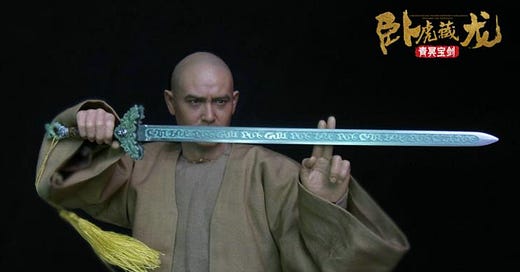Our Leisure Is Ideology
Narratives are comfortable worldbuilding and ideology is an escape to fantasy.
We are no longer comprehensible to each other, we inhabit different systems of signifiers, and all the mediating fantasies have melted away… - Sam Kriss
Way back in 2000, the Muvico Egyptian 24 movie theater opened at Arundel Mills mall. I was still in college and going to the movies was still fun. But going to Muvico was much more. There was a huge VIP valet parking area with red carpet and new Corvettes framed by massive Egyptian style columns, spotlights, and statues of Anubis. The inside carried the modern Egyptian theme right past the popcorn and gourmet food and into the theaters where each wall was painted with Egyptian scenes. The whole thing felt like another world, an immersive escape from whatever was bothering you.
The first movie I saw there was Crouching Tiger, Hidden Dragon. I still remember seeing it there, and I'm notorious for forgetting all sorts of memories. I was worried about my college workload and went with a couple of buddies on a Friday night to procrastinate. We fled our troubles past Anubis, ogling at the rich folk with the Corvettes as we passed, and then teleported through Egypt into the middle of a beautiful story in medieval China and lost track of everything else for a couple of hours. It was glorious.
This escape is not just a modern phenomenon. Humans have been telling stories since there were humans. When scientists did acoustic studies of caves with paintings they found the best acoustical properties near the paintings, making those locations better for oral storytelling or music. From Gilgamesh to the Lord Of The Rings to the latest space opera, we use our stories to help make sense of the world and to convey ideas and truths in powerful ways. Today, this ancient human trait has found a new and unexpected outlet.
I was reminded of the power of storytelling and my formative movie experiences, oddly, when I read Coleman Hughes critique of Ta-Nehisi Coates' latest book. I will admit my biases up front here: I find Coleman Hughes to be a reasonable, articulate interlocutor and Ta-Nehisi Coates to be one of the more vile race-baiters. I have listened, agreed, and disagreed with both. But even where I disagree — especially where I disagree — I find Hughes to be well-reasoned and logical and Coates to be fantastical and emotional.
It's this difference that so captivated me in Hughes' review. The substance of the disagreement — race and the Israel/Palestine conflict in particular — is mostly irrelevant. The critical language Hughes uses portrays the mechanisms behind Coates’ writing. Hughes talks about the "mythmaking" of Coates' essay about the 1619 project, and his “fantasy” around the idea of "white Jews and black Palestinians." He makes a point of noting Coates’ involvement with the "inspiring fantasy" of Black Panther.
And the words of Ta-Nehisi Coates taken from his book — admittedly without context — seem to portray the same fantastical ideas:
Here is what I think: We have a right to our imagined traditions, to our imagined places, and those traditions and places are most powerful when we confess that they are imagined. . . . And we have a right to imagine ourselves as pharaohs, and then again the responsibility to ask if a pharaoh is even worthy of our needs, our dreams, our imagination.
Our storytelling has evolved over time. Ever since Tolkien started writing in Elvish and built the entirely new world of Middle Earth, authors have enjoyed building whole new worlds. Tolkien is widely regarded as the O.G. of modern fantasy. There were worldbuilders before him - Francis Bacon's The New Atlantis is a notable early example - but nobody had ever been so immersive. Tolkien went deep. When I say he wrote Elvish I don't just mean one language. There's the complete languages of both Quenya and Sindarin and several sketched out cousin languages like Telerin, Eldarin and Nandorin. And there's multiple scripts too - Tengwar can be used to write both Quenya and Sindarin, Cirth is a rune-ish script used by the dwarves, and there are multiple dialects (modes) used by characters from different areas.

Tolkien was a philologist, so it would make sense he'd play with the language! But the different races and cultures have their own back stories, their own mythologies, creation myths, and subcultures. Tolkien took worldbuilding to an altogether different level. The world was meant to be a part of the story. Others were enraptured by this idea too, his friend C.S. Lewis among them, and a whole new genre was formed.
Fantasy is one of the most popular genres to this day. The top selling book and movie series of all time are almost all fantasy, or its close cousin science fiction. Harry Potter, LOTR, Game of Thrones, Star Wars, Marvel, Avatar: all of them have their own worlds and mythologies. And the worlds and myths play a key role in the storytelling.
This is a modern phenomenon and it's not on accident. Readers love the escape from reality that worldbuilding stories give them. Writers and movie creators love the creative expression. Both groups are submerging themselves and their identities into the world and it's characters. Each story is a new level of Dungeons and Dragons and everyone is a Dungeonmaster. We pay storytellers with our attention. We receive in return not just a world, but often an identity.
But attaching our identity to these stories comes with a lot of baggage. I still remember the ridiculous uproar from some Harry Potter fans when Rowling suggested she always thought of Dumbledore as gay. And don't get me started on the Snape-wives. Or the uproar about the sacrilege of the latest Star Wars trilogy. Or the horrible, shortened, very bad last season of Game of Thrones. (Yes, I'm still mad about that one.) These stories become such a part of us that we smother them in amber and present them as perfect jewels. We're unable to change our perceptions of them even when their creators go on creating… and change them.
Which brings me back to Coleman Hughes and Ta-Nehisi Coates. What Hughes so astutely points out is that Coates’ book is not meant as a dialectic work. It's not even a polemic. It's a fantasy. A myth. A worldbuilding activity.
Journalism and political commentary have become fantasy novels. QAnon and Tucker Carlson revisionist histories? That’s mythmaking. Indigenous land acknowledgements? That’s worldbuilding. I had Ta-Nehisi Coates all wrong. I genuinely thought he believed the one-sided arguments and anti-Israel tropes he is selling. But it doesn’t matter whether he believes it or not. Like a refined and experienced fantasy author, he is building his world.
This is our new leisure time. The authors and pundits take gratification and pleasure in building their myths and stories and we, the readers, enjoy the escape and in-group satisfaction of attaching our identities to them. Where we used to wind down with a movie or a mystery novel, now we unwind listening to a political podcast or a bunch of over-produced Reels. Ted Gioia pointed out that we don't read novels anymore. Instead, the only adult books on the Amazon bestseller list are political nonfiction (Coates' The Message is tops currently, followed closely by Melania).
I think this is the right way to understand almost all modern political conversations. They are not the pursuit of truth or policy or even power. They are the pursuit of myth. Our ideologies have supplanted the common fantasies we used to share. It shouldn't surprise us when someone rejects a criticism of their political ideology. They don't hear a logical argument, they hear a rejection of their fantasy. And this they cannot abide.
CBS just had Coates on to talk about his chart-topping book and Tony Dokoupil asked tough questions inline with Coleman Hughes’ criticism. But as soon as it aired, CBS had to start apologizing for it, saying that it didn’t meet “editorial standards.” Another CBS anchor, Jan Crawford, defended the interview: “I thought our commitment was to truth.”
The new commitment is not to truth and reality but to fantasy and myth. The ideology is the central tenet against which all facts must bend or break.
Perhaps this is a good thing. We've eliminated a different myth: the false mediating fantasy that our journalists, journalism, and the media are out for truth and justice and balance. Maybe that mediating fantasy needed to go away — we held onto it too strongly, just like an ideology.
As Martin Gurri presciently tells us in the Revolt of the Public, the vast firehose of information today has allowed our common myths to fracture into a thousand pieces. We're so busy focusing on our differences in identity — the things that we disagree with — that we've lost all the common mediating fantasies that held us together. They’ve all been dismantled.
Our post-truth world has driven us to construct new fantasy worlds. They reign over culture as a patchwork, a thousand overlapping idealogical fiefdoms vying for our allegiance based on how well we identify with their mythologies. We can’t modify their borders - their authors are in charge of them. And we can’t refute them, their walls are impervious to reason and logic and truth.
The paradoxical thing is that the truth is still in there somewhere, along with the common myths that our world is built upon. They are a crystal palace shakily constructed over the shared unstable foundation of conflicting ideologies. Or, if you prefer, it’s like a reliable transport layer like TCP on a completely unreliable foundation like IP. The American Dream still has some signal. And so does the Constitution and the Bill of Rights.
In light of this, Jan Crawford’s defense of hard questions becomes even more important:
“I’m not sure now how to proceed in challenging viewpoints that are obviously one-sided and devoid of fact and history.”
I do. Sideline it. Ignore it. The objective of these fantasies is clear: they seek to hold our attention not find truth. Attention is power today. Without an audience, a story shrivels up and its author moves on. Our best defense is to recognize the ridiculous fantasy worlds that many live in — and that some, like Ta-Nehisi Coates, are trying to sell us — and to sideline them as fringe, just as we do the Snape-wives.
We pay with our attention. It’s fruitless to blame the authors; the responsibility lies with us, the audience. If we can be more wary of how we value our attention and identity, then maybe we can reclaim the pursuit of truth based on complex, nuanced reality.
And that seems like a great starting point for some storytelling.





